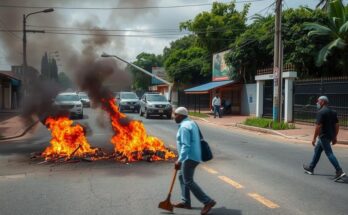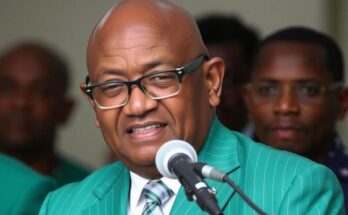Elvis Amoroso, the Venezuelan official who declared Nicolás Maduro the winner of a disputed election, has not been seen in public for ten weeks, leading to rumors of his detention or plans to defect. His absence is causing concern within the regime, as his claims are essential for maintaining Maduro’s legitimacy amid widespread allegations of election fraud.
Elvis Amoroso, the Venezuelan official credited with declaring Nicolás Maduro the victor of the contested July election, has remained absent from public view for ten weeks. The prolonged disappearance has sparked widespread speculation across social media, with theories ranging from his capture in Argentina and potential extradition to the United States, to fears that he has been detained by regime security forces over suspicions he may defect. Appointed by President Maduro to lead the National Electoral Council, Amoroso played a pivotal role in the polarized election, which the opposition claims was marred by fraud. He last appeared publicly on August 5th, presenting documents to the Supreme Court that purportedly corroborated Maduro’s claim of obtaining approximately 52% of the vote. However, opposition figures assert that these results are fabricated and contend that their candidate, Edmundo González, won with over 68%. International observers, including U.S. officials, have largely disregarded the election results announced by Amoroso, expressing doubts about their legitimacy. Amid intensified rumors, reports suggest that Amoroso is being held at the Caracas military complex, Fuerte Tiuna, following an alleged effort to leave the country. Analysts suggest that Amoroso’s significance to Maduro’s regime cannot be overstated. Antonio De La Cruz, president of the Washington-based think-tank Inter-American Trends, commented, “This is a guy that the regime can’t allow to leave; what is keeping Maduro in power is Amoroso’s claim that he won.” The regime has yet to substantiate Maduro’s electoral victory with official tallies, relying heavily on Amoroso’s assertions. Political science professor José Vicente Carrasquero emphasized the potential ramifications should Amoroso publicly confess he was misled: “It would be simply explosive for these people [in the regime].” The heightened rumor mill comes amid a sweeping crackdown, resulting in the apprehension of approximately 2,000 dissidents who allege election fraud. Several of those detained are reportedly enduring torture or confinement in regime-operated reeducation camps. Amoroso’s absence from public engagements following the Supreme Court proceedings has unleashed fervent speculation in Venezuela. Initial rumors posited that he was arrested in Argentina, a country that has placed an arrest order against Maduro for human rights violations, while later claims indicated that he was held involuntarily at Miraflores Palace. Although these assertions have lacked credible verification, his whereabouts remain elusive. Ivan Simonovis, the former intelligence chief for recognized opposition leader Juan Guaidó, remarked that if Amoroso were in the country, he would be under relentless surveillance. “That is the fate of those who possess the most damaging secrets of the regime,” he stated, reflecting the dire circumstances surrounding loyalty and power dynamics in Venezuela.
The situation surrounding Elvis Amoroso is emblematic of the considerable political tensions and human rights concerns in Venezuela. Following the highly contested July election, in which allegations of fraud surfaced prominently, considerable skepticism from both domestic and international actors has persisted. As a close ally of Nicolás Maduro, Amoroso’s role in declaring Maduro’s supposed victory has positioned him as a key figure within the regime, and his unexpected disappearance raises pressing questions regarding political allegiance, control, and the integrity of the Venezuelan electoral process. The alleged repression of dissenters and the environment of fear within Venezuela further complicate the landscape.
Elvis Amoroso’s ongoing absence from public view has ignited a series of intense rumors and speculation regarding his fate, reflecting the precarious nature of loyalty within Venezuela’s political framework. As a central figure in the disputed July election, Amoroso’s potential defection or admission of deception could have profound implications for Nicolás Maduro’s regime, particularly as it faces mounting criticism and skepticism regarding its legitimacy both domestically and internationally. The political climate remains fraught with uncertainty, underlining the crucial balance of power and the dire stakes for those involved in the political machinations of Venezuela.
Original Source: www.miamiherald.com




